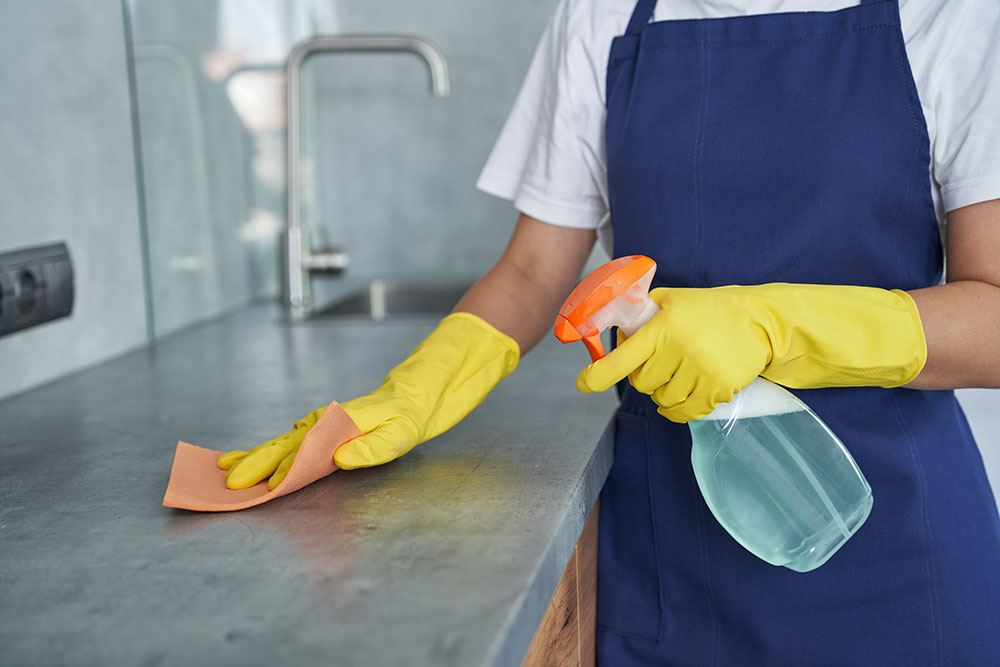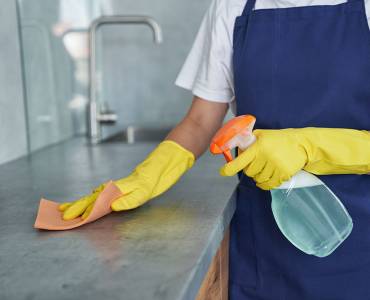Commercial kitchens should be deep cleaned weekly to maintain hygiene and food safety standards. Regular deep cleaning is essential for preventing cross-contamination and ensuring a clean working environment for kitchen staff.
A well-maintained kitchen not only promotes health and safety but also prolongs the lifespan of equipment and minimizes the risk of pest infestation. By adhering to a weekly deep cleaning schedule, commercial kitchens can uphold cleanliness standards required by health regulations, impress customers with a well-organized space, and ultimately boost the overall efficiency of the operation.
Prioritizing deep cleaning practices is not only a hallmark of professionalism but also a crucial aspect of running a successful commercial kitchen.
Importance Of Regular Deep Cleaning
Regular deep cleaning of a commercial kitchen is crucial to prevent contamination and ensure the maintenance of hygiene standards. This process should be carried out frequently to uphold a clean and safe environment for food preparation.

Credit: www.kitchendeepcleaninglondon.co.uk
Factors Influencing Deep Cleaning Frequency
The frequency of deep cleaning a commercial kitchen depends on several factors. These factors include the type of establishment, volume of cooking, and type of food prepared.
For instance, high-volume kitchens typically require more frequent deep cleaning compared to low-volume kitchens. Additionally, kitchens that prepare greasy or fried foods may need more frequent cleaning to prevent grease buildup.
Minimum Deep Cleaning Schedule
Daily Cleaning Tasks
Ensure countertops and food preparation surfaces are cleaned and sanitized daily.
Weekly Cleaning Tasks
Deep clean kitchen equipment, such as ovens and grills, on a weekly basis.
Monthly Cleaning Tasks
Perform a thorough cleaning of exhaust hoods and ductwork on a monthly basis.
Signs That Indicate The Need For Deep Cleaning
Commercial kitchens should be deep cleaned regularly to maintain hygiene and safety standards. Signs that indicate the need for deep cleaning include persistent odors, grease build-up, and insect infestation.
Benefits Of Regular Professional Deep Cleaning
Regular professional deep cleaning of a commercial kitchen offers several key benefits that can significantly impact its longevity and efficiency. Firstly, by ensuring regular deep cleaning, you can increase the lifespan of equipment. Oils, grease, and other culinary residues can accumulate and cause corrosion or damage. By removing these deposits through deep cleaning, you can prevent wear and tear, ultimately extending the life of your equipment.
Secondly, deep cleaning can result in improved energy efficiency. When equipment is free from dirt and grime, it operates more efficiently and consumes less energy. This can lead to noticeable cost savings and a more sustainable kitchen environment.
Lastly, regular deep cleaning helps to reduce the risk of fire hazards. Grease build-up in hard-to-reach areas, such as exhaust hoods and ducts, can easily ignite and cause a fire. By thoroughly cleaning these areas, you can minimize the risk of fire and protect the safety of your kitchen staff and property.
In summary, regular professional deep cleaning of a commercial kitchen brings numerous benefits, including increased equipment lifespan, improved energy efficiency, and reduced fire hazards. Investing in regular deep cleaning ensures the smooth operation and longevity of your kitchen while prioritizing safety and sustainability.
Standard Cleaning Procedures For Different Kitchen Areas
When it comes to maintaining hygiene in a commercial kitchen, deep cleaning is crucial. Each area of the kitchen requires specific cleaning procedures to ensure cleanliness and safety. Cooking surfaces and equipment should be cleaned thoroughly after each use to remove grease and food residue. Cleaning the ventilation and exhaust systems regularly prevents the buildup of grease, maintains proper airflow, and reduces the risk of fire. Floors and drains should be cleaned daily to prevent the accumulation of dirt, debris, and bacteria. Regular professional deep cleaning is essential to remove stubborn stains and grime that can accumulate over time.
By following these standard cleaning procedures for different kitchen areas, you can ensure a clean and safe environment for food preparation. Regular cleaning not only maintains hygiene but also extends the lifespan of equipment and reduces the risk of contamination.
Choosing A Professional Deep Cleaning Service
Experience and Expertise: When choosing a professional deep cleaning service for your commercial kitchen, it’s crucial to consider their experience and expertise in the industry. Look for a service provider that has a proven track record in deep cleaning commercial kitchens.
Certifications and Compliance: Ensure that the cleaning service holds necessary certifications and complies with industry standards and regulations. This will give you peace of mind knowing that the cleaning is being carried out to the highest standards.
Customer Reviews and Testimonials: Reading customer reviews and testimonials can provide valuable insight into the quality of service provided by the cleaning company. Look for positive feedback and recommendations from other commercial kitchen owners before making your decision.

Credit: www.icecleaning.co.uk

Credit: www.icecleaning.co.uk
Frequently Asked Questions On How Often Should A Commercial Kitchen Be Deep Cleaned
How Often Should A Commercial Kitchen Be Deep Cleaned?
A commercial kitchen should be deep cleaned at least once a month to ensure a safe and hygienic environment for food preparation.
What Are The Benefits Of Regular Deep Cleaning In A Commercial Kitchen?
Regular deep cleaning in a commercial kitchen helps prevent foodborne illnesses, maintain equipment efficiency, and comply with health and safety regulations.
What Areas In A Commercial Kitchen Require Deep Cleaning?
Areas in a commercial kitchen that require deep cleaning include floors, walls, ceilings, equipment, appliances, exhaust systems, and drains.
How Long Does A Deep Cleaning Session Typically Take In A Commercial Kitchen?
The duration of a deep cleaning session in a commercial kitchen varies depending on the size of the kitchen, but it usually takes several hours to complete.
Should I Hire Professional Cleaners For Deep Cleaning My Commercial Kitchen?
Yes, it is recommended to hire professional cleaners for deep cleaning a commercial kitchen as they have the expertise, tools, and chemicals to ensure a thorough and efficient clean.
Conclusion
The frequency of deep cleaning your commercial kitchen is crucial for maintaining hygiene and safety standards. Regular deep cleaning can prevent contamination and improve the overall efficiency of the kitchen. By following a consistent deep cleaning schedule, you can ensure a clean and healthy environment for your staff and customers.

